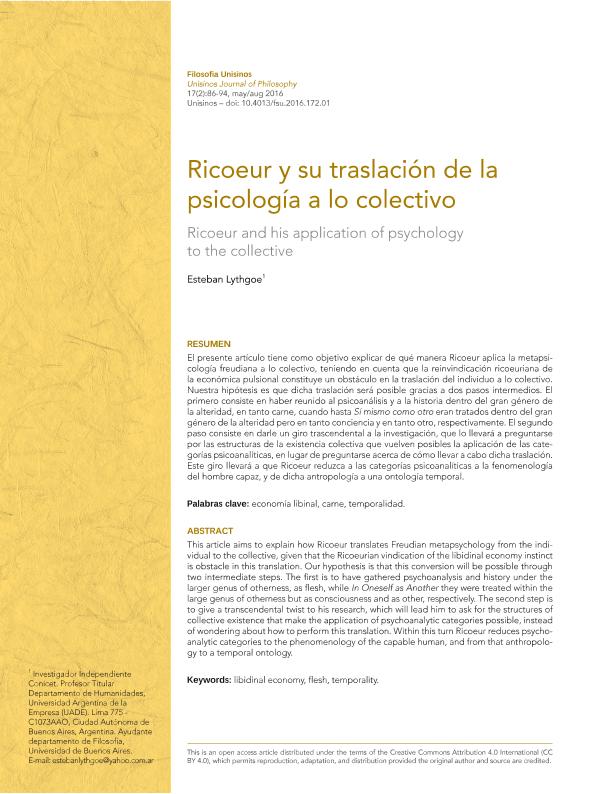Mostrar el registro sencillo del ítem
dc.contributor.author
Lythgoe, Esteban

dc.date.available
2020-06-02T14:54:20Z
dc.date.issued
2016-06
dc.identifier.citation
Lythgoe, Esteban; Ricoeur y su traslación de la psicología a lo colectivo; Universidade do Vale do Rio dos Sinos; Unisinos; 17; 2; 6-2016; 86-94
dc.identifier.issn
1984-8234
dc.identifier.uri
http://hdl.handle.net/11336/106468
dc.description.abstract
El presente artículo tiene como objetivo explicar de qué manera Ricoeur aplica la metapsicología freudiana a lo colectivo, teniendo en cuenta que la reinvindicación ricoeuriana de la económica pulsional constituye un obstáculo en la traslación del individuo a lo colectivo. Nuestra hipótesis es que dicha traslación será posible gracias a dos pasos intermedios. El primero consiste en haber reunido al psicoanálisis y a la historia dentro del gran género de la alteridad, en tanto carne, cuando hasta Sí mismo como otro eran tratados dentro del gran género de la alteridad pero en tanto conciencia y en tanto otro, respectivamente. El segundo paso consiste en darle un giro trascendental a la investigación, que lo llevará a preguntarse por las estructuras de la existencia colectiva que vuelven posibles la aplicación de las categorías psicoanalíticas, en lugar de preguntarse acerca de cómo llevar a cabo dicha traslación. Este giro llevará a que Ricoeur reduzca a las categorías psicoanalíticas a la fenomenología del hombre capaz, y de dicha antropología a una ontología temporal.
dc.description.abstract
This article aims to explain how Ricoeur translates Freudian metapsychology from the individual to the collective, given that the Ricoeurian vindication of the libidinal economy instinct is obstacle in this translation. Our hypothesis is that this conversion will be possible through two intermediate steps. The first is to have gathered psychoanalysis and history under the larger genus of otherness, as flesh, while In Oneself as Another they were treated within the large genus of otherness but as consciousness and as other, respectively. The second step is to give a transcendental twist to his research, which will lead him to ask for the structures of collective existence that make the application of psychoanalytic categories possible, instead of wondering about how to perform this translation. Within this turn Ricoeur reduces psychoanalytic categories to the phenomenology of the capable human, and from that anthropology to a temporal ontology.
dc.format
application/pdf
dc.language.iso
spa
dc.publisher
Universidade do Vale do Rio dos Sinos
dc.rights
info:eu-repo/semantics/openAccess
dc.rights.uri
https://creativecommons.org/licenses/by/2.5/ar/
dc.subject
libidinal economy
dc.subject
flesh
dc.subject
temporality
dc.subject.classification
Filosofía, Historia y Filosofía de la Ciencia y la Tecnología

dc.subject.classification
Filosofía, Ética y Religión

dc.subject.classification
HUMANIDADES

dc.title
Ricoeur y su traslación de la psicología a lo colectivo
dc.title
Ricoeur and his application of psychology to the collective
dc.type
info:eu-repo/semantics/article
dc.type
info:ar-repo/semantics/artículo
dc.type
info:eu-repo/semantics/publishedVersion
dc.date.updated
2020-05-29T20:19:13Z
dc.journal.volume
17
dc.journal.number
2
dc.journal.pagination
86-94
dc.journal.pais
Brasil

dc.journal.ciudad
Porto Alegre
dc.description.fil
Fil: Lythgoe, Esteban. Universidad Argentina de la Empresa; Argentina. Universidad de Buenos Aires. Facultad de Filosofía y Letras; Argentina. Consejo Nacional de Investigaciones Científicas y Técnicas; Argentina
dc.journal.title
Unisinos
dc.relation.alternativeid
info:eu-repo/semantics/altIdentifier/url/http://revistas.unisinos.br/index.php/filosofia/article/view/fsu.2016.172.01/5680
dc.relation.alternativeid
info:eu-repo/semantics/altIdentifier/url/http://revistas.unisinos.br/index.php/filosofia/article/view/fsu.2016.172.01/5680
dc.relation.alternativeid
info:eu-repo/semantics/altIdentifier/doi/http://dx.doi.org/10.4013/fsu.2016.172.01
Archivos asociados
